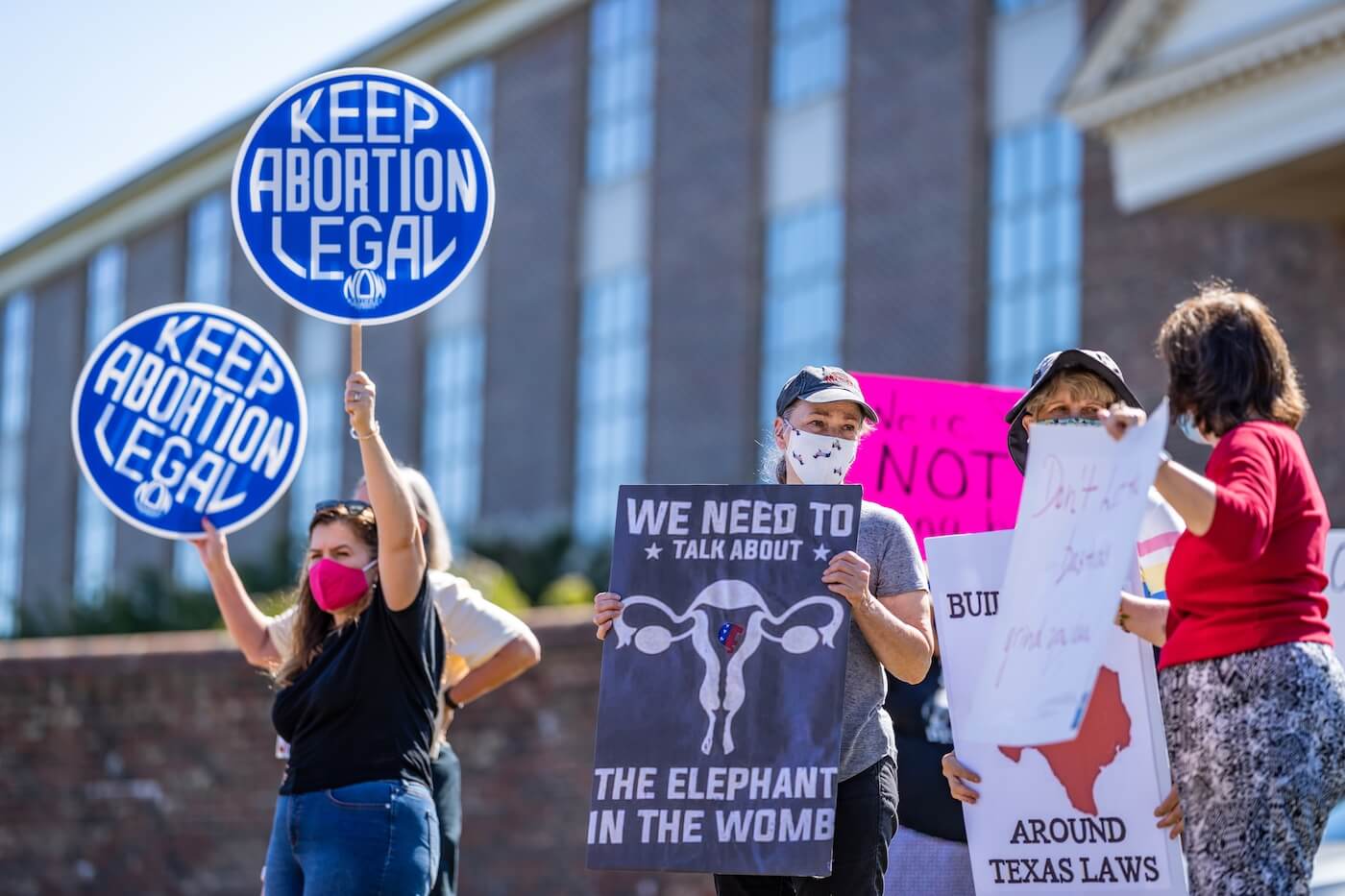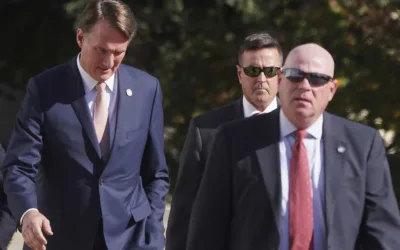
WILLIAMSBURG, VIRGINIA USA - October 1, 2021: Scenes from the Women's March sponsored by Williamsburg JCC Indivisible at the James City County Courthouse. (Image via Shutterstock/Michael Scott Milner)
With a GOP governor in office and Republicans controlling the House of Delegates, where Virginia now stands on abortion is becoming clearer.
With a new administration comes a new view on a person’s right to make their own family planning decisions. On Jan. 21, Virginia Attorney General Jason S. Miyares sent a letter to the US Supreme Court—which is considering the constitutionality of a ban on abortion in Mississippi after 15 weeks—to withdraw the commonwealth’s opposition to that law. In fact, Miyares, a Republican, suggested the landmark decision in Roe v. Wade, which legalized access to abortion 49 years ago this past weekend, should be overturned.
“Virginia is now of the view that the Constitution is silent on the question of abortion,” Miyares wrote, “and that it is therefore up to the people in the several states to determine the legal status and regulatory treatment of abortion.”
If the conservative-majority Supreme Court upholds the Mississippi law, Roe v. Wade would be undone. If that happens, 26 states are “certain or likely” to ban abortion, according to the Guttmacher Institute.
According to a 2014 Pew Research Center report, 55% of Virginia voters believe abortion should be legal in all or most cases.
With the GOP in charge in both the governor’s office and the House of Delegates, plus an anti-abortion Republican lieutenant governor with a tie-breaking vote in the Senate, the future of access to abortion is uncertain in Virginia.
A (Brief) Recent History of Abortion in Virginia
Reproductive rights were not a motivating factor for voters in Virginia’s recent statewide elections, but Gov. Glenn Youngkin established himself as someone who is “pro-life.” In July 2021, the Washington Post reported on a video of the then-candidate talking about how he had to limit what he said about abortion rights because he did not want to ailenate any potential independent voters, but said if elected, he would go “on offense.” The video was allegedly shot during a campaign event in Loudoun County.
When Virginia Democrats took control of the General Assembly in 2019, they—with the help of former Gov. Ralph Northam—repealed several laws that restricted access to abortion care. Among them were regulations that forced clinics to close in the early 2010s, thanks to then-Attorney General Ken Cuccinelli. Other restrictions that were lifted included a 24-hour waiting period that former Gov. Bob McDonnell put in place, as well as a rule that stated nurse practitioners could not perform abortions in the first trimester.
By overturning those medically unnecessary barriers, Virginia became a “haven” for abortion rights, Amy Hagstrom Miller, the chief executive of Whole Woman’s Health, told The Lily
Thanks to legislation that took effect in 2021, patients in Virginia can also access at-home abortion medication using telehealth visits, meaning they can get a medical abortion without needing reliable transportation or living close to a more populous city with abortion clinics. Before telehealth visits were available, some patients drove over 100 miles just to meet with an abortion provider. The service is only available to patients who are nine weeks pregnant or less, which represents a large portion of abortions performed.
Del. Sally Hudson, who represents Charlottesville, told the Virginia Mercury that “anti-abortion advocates had spent a decade building medically unnecessary hurdles to essential health care.” Democrats were able to repeal several restrictions via the Reproductive Health Protection Act in 2019.
Despite all that, there is still a lot of work that needs to be done to help ensure reproductive rights aren’t taken away from residents.
New Efforts to Restrict Abortion Access
Pro-choice advocates in Virginia are worried that all of the progress made so far will be upended.
As of Jan. 1, 2022, the following barriers are in place on abortion in Virginia:
- The parent of a minor must consent and be notified of the abortion before it is provided.
- Abortion is covered by insurance policies for public employees, but only in cases of rape, incest, fetal impairment, or if the mother’s life is in danger.
- Public funds are available for abortion only in cases of rape, incest, or fetal impairment, as well as if the mother’s life is in danger.
- Third trimester abortions may only be performed if the mother’s life or health is in danger.
Access is also limited. As of 2019, NARAL Pro-Choice Virginia reported that around 92% of counties in the commonwealth do not have any abortion clinic at all.
Despite that, pro-life groups such as Students For Life Action, headquartered in Fredericksburg, and the Virginia Society For Human Life, the nation’s oldest pro-life organization, have been working with anti-choice legislators to introduce “heartbeat bills.” If passed, those bills would ban all abortion at six weeks’ gestation, when many women may not even be aware that they’re pregnant.
Winsome Earle-Sears, Virginia’s new Lt. Governor, has promised that if “heartbeat” legislation is introduced, she will fully support it.
In the current General Assembly session, there have been no “heartbeat” bills introduced thus far, but there are several anti-choice lawmakers who have introduced legislation designed to undo all of the progress Virginia’s Democrats have made.
For example, state Rep. Phillip A. Scott’s HB 983 targets providers who offer abortion care, among other things: “The bill also provides that a person who performs an abortion with knowledge that the abortion is sought solely and exclusively on account of a genetic disorder, the sex, or the ethnicity of the unborn child is guilty of a Class 4 felony.”
Rep. Nick Freitas’s HB 1274, also known as the “Pain-Capable Unborn Child Protection Act,” aims to ban abortion after 20 weeks gestation, and would also punish medical professionals who perform abortions after 20 weeks with a Class 6 felony.
Another bill that would create medically unnecessary barriers for people seeking abortion care is HB 212, introduced by Rep. Karen Greenhalgh. Her bill would require women to undergo biased counseling 24 hours before the abortion is scheduled to take place. The counseling would also include a “medical explanation of the nature, benefits, and risks of and alternatives to the proposed procedures or protocols to be followed in her particular case.”
The good news is that Democrats still have a slim majority in the state Senate, making it unlikely that any of these restrictive abortion bills are signed into law. If they had retained the House of Delegates, however, there was a chance that Roe v. Wade would have been codified in the state constitution, like 15 states and Washington, DC, have already done.
Nevertheless, the impact of electing a conservative as governor is already taking shape. Gov. Youngkin recently appointed Angela Sailor, a former Heritage Foundation executive, to the post of Chief Diversity Officer for Virginia. During Youngkin’s first week in office, he issued an executive order that would add some new duties to her position, including “ambassador for unborn children.”

Here’s everything you need to know about this month’s Mercury retrograde
Does everything in your life feel a little more chaotic than usual? Or do you feel like misunderstandings are cropping up more frequently than they...

VIDEO: Check out Dogwood’s new merch line
Big news, Virginia! We've officially launched our Dogwood merch line 🎉 This year, we celebrate 5 years of bringing you Virginia news you can use....

VIDEO: Your support matters!
Your support matters! Donate today. @vadogwoodnews Your support matters! Visit our link in bio to donate today. #virginianews #virginia #community...

Op-Ed: Virginia’s new Democratic majorities pass key bills to improve your lives, but will Youngkin sign them?
The 2024 Virginia General Assembly regular session has wrapped up. It was a peculiar session from the outset, with Democratic majorities in the...

From the state rock to the state flower, here’s how Virginia got its symbols
Have you ever wondered why the Dogwood is the state flower? Or how the cardinal became the state bird? We’re here to answer those questions and more...

VIDEO: Second-gentleman Douglas Emhoff gives speech on reproductive freedom
Second gentleman, Douglas Emhoff touched on reproductive freedom not only being a woman's issue but "an everyone's issue" during the Biden-Harris...





